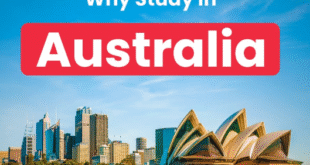Study in Australia :
Australia continues to be a premier destination for international students seeking quality education, diverse cultural experiences, and promising career opportunities. As we look toward 2026, this comprehensive guide delves into the essential aspects of studying in Australia, including tuition fees, living expenses, top universities, popular courses, and more.
Tuition Fees for International Students in Australia
Tuition fees in Australia vary based on the university, course, and level of study. Here’s an overview of estimated annual tuition fees for international students:
| University | Estimated Annual Tuition Fees (AUD) |
|---|---|
| University of Melbourne | $26,500 – $113,000 |
| Monash University | $39,000 – $56,000 |
| University of Sydney | $46,000 – $61,000 |
| Australian National University (ANU) | $45,000 – $60,000 |
| University of Queensland | $43,000 – $54,000 |
| University of New South Wales (UNSW) | $44,000 – $95,000 |
| University of Adelaide | $41,000 – $99,000 |
| University of Western Australia | $40,000 – $51,000 |
| University of Technology Sydney (UTS) | $32,000 – $52,000 |
| Macquarie University | $40,000 – $90,000 |
Living Expenses in Australia
Living costs in Australia can vary depending on the city and lifestyle. On average, international students should budget between AUD 1,400 and AUD 2,500 per month. Here’s a breakdown of typical monthly expenses:
-
Accommodation: AUD 90 – $440 per week
-
Food: AUD 140 – $280 per week
-
Transportation: AUD 30 – $60 per week
-
Utilities (electricity, gas, internet): AUD 25 – $50 per week
-
Entertainment: AUD 80 – $150 per week
Accommodation Options
International students have various accommodation options:
-
On-Campus Housing: AUD 110 – $280 per week
-
Shared Rentals: AUD 95 – $215 per week
-
Homestay: AUD 235 – $325 per week
-
Private Rentals: AUD 185 – $440 per week
Health Insurance
Overseas Student Health Cover (OSHC) is mandatory for international students. The cost typically ranges from AUD 500 to $1,200 annually, depending on the duration of your stay and the insurance provider .
Student Visa Costs
The cost for an Australian student visa (subclass 500) is approximately:
-
Students aged 18 or above: AUD 1,080
-
Students under the age of 18: AUD 770
Popular Courses for International Students
Australia offers a wide range of courses. Some popular fields of study among international students include:
-
Business and Management
-
Engineering and Information Technology
-
Health Sciences and Medicine
-
Education and Teaching
-
Hospitality and Tourism
-
Environmental Science and Sustainability
Top Universities in Australia
Australia is home to several world-renowned universities. Some of the top institutions include:
-
University of Melbourne: Known for its strong research programs and diverse student body.
-
Australian National University (ANU): Renowned for its focus on research and policy studies.
-
University of Sydney: Offers a wide range of programs with a strong emphasis on global engagement.
-
University of Queensland (UQ): Recognized for its research in agriculture and environmental sciences.
-
University of New South Wales (UNSW): Offers strong programs in engineering and business.
Application Process
The application process for Australian universities typically involves:
-
Choosing a Course and University: Research programs that align with your career goals.
-
Meeting Entry Requirements: Ensure you meet academic and English language proficiency requirements.
-
Submitting an Application: Apply directly through the university’s website or through an authorized agent.
-
Receiving an Offer: If accepted, you’ll receive a Confirmation of Enrolment (CoE).
-
Applying for a Student Visa: Use your CoE to apply for a student visa.
Scholarships and Financial Aid
Many Australian universities offer scholarships to international students. Some notable scholarships include:
-
Australia Awards Scholarships: Funded by the Australian Government, these scholarships cover tuition, living expenses, and travel costs.
-
University-Specific Scholarships: Many institutions offer merit-based scholarships for international students.
Work Opportunities for Students
International students in Australia are allowed to work up to 40 hours per fortnight during the semester and unlimited hours during semester breaks. Common student jobs include:
-
Retail and Hospitality: Positions in cafes, restaurants, and stores.
-
Tutoring: Offering academic assistance to peers.
-
Internships: Gaining industry experience related to your field of study.
Note: It’s important to balance work and study commitments to maintain academic performance.
Post-Graduation Opportunities
After completing your studies, you may be eligible for the Temporary Graduate Visa (subclass)
Work Opportunities
Post-Study Work Visa (Subclass 485)
-
Allows international students to live, study, and work in Australia temporarily after graduation.
-
Duration:
-
Bachelor’s degree: Up to 4 years
-
Master’s degree (coursework/research): Up to 5 years
-
Doctorate (PhD): Up to 6 years
-
-
Must have studied at an Australian institution for at least 2 years.
-
Eligible occupations can be found on the Medium and Long-term Strategic Skills List (MLTSSL).
Job Market
-
In-demand fields:
-
Information Technology.
-
Engineering.
-
Health Care and Nursing.
-
Education.
-
Accounting and Finance.
-
Further Studies
-
Students may choose to pursue:
-
Honours programs (for Bachelor graduates)
-
Graduate Certificates/Diplomas
-
Master’s by Research or Coursework
-
PhD
-
-
Universities also offer pathways from coursework to research-based degrees.
Permanent Residency Pathways
Australia offers several skilled migration programs that can lead to PR:
-
Skilled Independent Visa (subclass 189)
-
Skilled Nominated Visa (subclass 190)
-
Regional Sponsored Migration Scheme (subclass 491)
Points are awarded based on:
-
Age
-
English language ability
-
Qualifications
-
Work experience
-
Australian education
Entrepreneurship and Startups
Australia supports innovation and startups through:
-
Incubators and accelerators (e.g., Startmate, Cicada Innovations)
-
Government grants like Accelerating Commercialisation
-
Visa options: Business Innovation and Investment Visa (subclass 188)
Internships and Industry Experience
-
Graduate programs are common in large Australian companies (e.g., Telstra, BHP, Deloitte)
-
Internships during or after studies can lead to full-time employment.
-
Professional Year Programs (PYPs) are available for IT, Accounting, and Engineering graduates.

